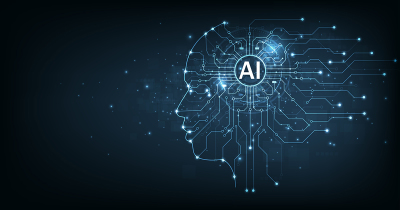
History has shown us what happens when Christians abdicate intellectual leadership.
We’ve watched from the sidelines as critical decisions about science, healthcare, and technology were made without the Christian intellectual and moral tradition at the table. This ends here.
Unless followers of Jesus are positioned and prepared to be credible voices in the sciences and technology, the Christian worldview will once again be largely absent from key decisions about AI, ultimately negatively impacting the future of human flourishing.
The rapid development of artificial intelligence represents both unprecedented opportunity and profound risk. We stand at a defining moment in the history of human innovation — and Christian higher education cannot afford to be absent from this conversation. We must fill this vacuum by forming brilliant Christian graduates and leaders.
We should not fear AI.
I genuinely believe AI is providing a better future for human flourishing. The potential is staggering: democratizing access to quality education, accelerating medical research that alleviates suffering, advancing Bible translation for unreached people groups, and freeing humans from tedious work to focus on creative, meaningful tasks. These are Kingdom purposes, and we should pursue them with vigor and vision.
But I also believe this is a clarion call for uncompromising, unwavering Christian education to prepare the next generation. These two convictions are inseparable. AI’s potential for good will only be realized if we raise up leaders who possess both technical excellence and moral clarity, both innovative thinking and theological depth, both the skills to build powerful systems and the wisdom to ask whether they should.
Here’s the truth we must grasp: AI is neutral, until it is biased and given a teaching set of good or bad intentions. The technology itself is mathematics, algorithms, processing power. But the moment humans choose what data to train it on, what objectives to optimize for, and what guardrails to implement or ignore, neutrality vanishes. AI becomes a reflection of human values — and yes, our biases and brokenness.
This is why the question of who builds these systems matters enormously. When AI is trained on data reflecting human prejudice, it perpetuates and amplifies that prejudice. When it’s optimized for engagement rather than truth, it spreads misinformation. When it’s built without diverse perspectives, it serves some while harming others. Christians understand that humans, though made in God’s image, are fallen and prone to encoding our worst impulses into the systems we create.
This is precisely why we must double down on the liberal arts and humanities. Some argue these disciplines are obsolete in an age of automation. Nothing could be further from the truth. In the end, it is the human studying humanities who builds the machine. The engineers creating AI systems make countless decisions shaped by their understanding of ethics, philosophy, history and human nature. What biases get encoded? What values are prioritized? What assumptions about human flourishing guide development? These questions cannot be answered by technical expertise alone.
When our students study Augustine and Wilberforce, C.S. Lewis and Francis Schaeffer, they’re developing the moral imagination necessary to build technology that serves human dignity. When they engage philosophy and ethics, they learn to ask the critical questions technologists often overlook. This is why our commitment to rigorous, Christ-centered liberal arts education is non-negotiable.
We must also be honest about the dangers: surveillance capitalism, algorithmic bias, job displacement, autonomous weapons, privacy erosion, and the concentration of power. Our credibility on AI’s promise depends on our willingness to address these threats forthrightly. Christians take sin and human fallenness seriously — including in our technological systems. We need human accountability embedded in every AI application, ensuring that people — not algorithms — make final decisions on matters affecting human welfare.
But this work requires institutional courage. We need clear ethical boundaries established now, not reactively. We need policies addressing academic integrity while teaching discernment rather than simply prohibiting technology.
Here’s what I know: the next generation will inherit unprecedented technological power. What will guide their use of that power? What formation will they have received? What loves will order their lives? These questions demand that Christian higher education be stronger, more rigorous and more faithful than ever before.
The world doesn’t need Christian universities that are merely secular institutions with chapels attached. It needs institutions that integrate faith and learning at every level, that form students in a coherent biblical worldview, and that send graduates into every sector equipped to lead with both excellence and integrity.
This is our moment. Christian universities must become demonstration sites for ethical AI implementation — showing the world what redemptive technology looks like. We must use our platforms to publish guidelines, host conferences bringing theologians and technologists together and engage directly with companies seeking ethical guidance.
I am optimistic about what AI can accomplish for human good. But that optimism is grounded in an uncompromising commitment to preparing the next generation with education that is rigorously Christian, intellectually excellent, and morally formed. The teaching sets we create today will shape the world our children inherit tomorrow.
As president of Colorado Christian University, I believe we have a sacred responsibility to lead in this space, ensuring that followers of Jesus are positioned to be credible, influential voices in technology and the sciences.
At CCU, we’re not just talking about this — we’re building it. We are launching leaders who will refuse to be led by this culture, but lead it. We’re not preparing students to simply adapt to whatever Silicon Valley creates — we’re equipping them to shape what gets created in the first place. We’re raising up men and women who will walk into technology companies, research institutions, and startups with both technical excellence and unshakable conviction about human dignity, truth and justice.
We opened an AI incubator, called the Quarry Innovation Lab, on our campus. We’re creating a physical space where research, student experiences, faculty development and ethical AI implementation converge. This isn’t about chasing trends; it’s about faithful stewardship of powerful tools that will shape the next century.
We’re also developing curriculum that integrates technical competence with theological reflection. We’re training students to recognize that when they choose training datasets or write algorithms, they’re making profoundly moral decisions. We’re preparing them to enter technology companies, research institutions and startups as voices for human dignity, truth and justice.
We refuse to stand on the sidelines. We’re building the future — one student, one innovation, one Kingdom-minded decision at a time.
This is Christian Higher Education’s moment to lead. Let’s not waste it.
Eric Hogue is the president of Colorado Christian University, the leading interdenominational Christian university in the Rocky Mountain region. Hogue is known for his roles as a former political candidate; practicing theologian and pastor; and long-tenured radio, television and media professional. He is the author of The Winning Side of the Ask: The Heart and Skills of the Donor-Centric Professional Fundraiser, a book dedicated to helping nonprofits design a thriving philanthropic culture.






